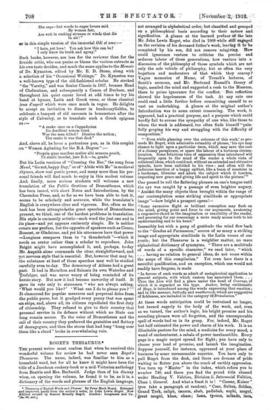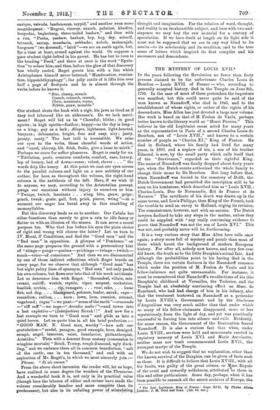ROGET'S THESAURUS.*
'THE present writer must confess that when he received this -wonderful volume for review he had never seen Roget's Thesaurus. The name, indeed, was familiar to him as a 'household word, but for all he knew it might have been the -title of a Jacobean cookery-book or a mid-Victorian anthology from Beattie and Mrs. Barbauld. Judge then of his die;nay when, on opening the volume, he found it to be, as it is, a dictionary of the words and phrases of the English language, • Thssauras of English Words and Phrasss:' By Peter Mark Boget. Enlarged and improved, partly from the aatbor's notes, by John Lewia Jloget. New- Manion revised by Samuel Bomilly Boffst. London: Lonsmans and Co. 'pa. 6d. net.]
not arranged in alphabetical order,- but classified and grouped on a. philosophical basis -according to their nature and signification. A glance at the learned preface of the late
Mr. John Lewis .Roget, who died- in 1908- while still engaged on the revision of his deceased father's work, leaving it to be completed- by his son, did not remove misgiving. How could ignorance venture to criticise the precise and
arduous labour of three generations, • how venture into a discussion of the philosophy of those symbols which are not only the sole vehicle' of philosophy, but so often the very begetters and moderators of that which they convey ? Vague memories of Hume, of Trench's lectures, of South's sermons, and Mr. Bertrand Russell's theory of logic, assailed the mind and suggested a rush to the Museum, there to prime ignorance for the conflict. `• But reflection i3howed the hopelessness of the task. At any rate one could read a little further before committing oneself to so vast an undertaking. A glance at the original author's Introduction was to some extent reassuring. The work, it appeared, had a practical purpose, and a purpoie Whiclicould hardly fail to arouse the sympathy of one who, like those to
whom the work is addressed, too often finds -himself" pain-
fully groping his way and struggling with the difficulty of composition."
"'Even while glancing over the columns of this work,' so pro- ceeds Mr. Beget, with admirable rotundity of phrase, 'his eye may chance to light upon a particular term, which may save the cost of a clumsy paraphrase, or spare the labour of a tortuous circum- locution. Some felicitous turn of expression thus introduced will frequently open to the mind, of the reader a whole vista of collateral ideas, which could not, without an extended and obtrusive episode, have been unfolded to his view : and often will the judicious insertion of a happy epithet, like a beam of sunshine in a landscape, illumine and adorn the subject which it touches, imparting new grace and giving life and spirit to the picture:"
One paused to roll the flattering phrases on one's tongue until the eye was caught by a passage of even brighter augury.
Amidst the many objects thus brought within the range of our contemplation some striking similitude or appropriate
image "—how bright a prospect opens!— "Some excursive flight or brilliant conception may flash on the mind, giving point and force to our arguments, awakening a responsive chord in the imagination or sensibility of the reader, and procuring for our reasonings a more ready access both to his understanding and to his heart."
Insensibly but with a pang of gratitude the mind flew back to the " Gradus ad Parnassum," source of so many a striking
image and appropriate similitude in the Latin verses of our youth; but the Thesaurus is a weightier matter, no mere
alphabetical dictionary of synonyms. " There are a multitude of words of -a specific character," we read -later, • " whiCh . . . having no relation to general ideas; do note Come within the scope of this compilation." Yet even here there is a merciful qualification, and an exception, which one would not readily have forgone, is made .
" In favour of such words as admit of metaphorical applicatien to general subjects, with which custom has associated them. . . . Thus the Lion will find a place under the head of Courage, of which it is .regarded as the type. Anchor, being emblematic of Hope, is introduced among the words expressing that emotion ; and in like manner, butterfly and weatkercock,Ivhich are suggestive of fickleness, are included in the category'tiVist+esotation.'
At these words anticipation could be restrained no longer, but turned eagerly to the body of the work, and, even as we turned, the author's logic, his bright promise and his, sounding phrases were all forgotten, and the unconquerable spell of words had us in its grasp. For, indeed, Mr. Roget but half estimated the power and charm of his work. It is an illimitable pasture for the mind, a medicine for every mood, a wand of enchantment, a cabala of power inexhaustible. Every page is a magic carpet spread for flight; you have only to choose your land of promise, and Iainich the imagination. Suppose yourself, for instance, oppressed at youi place of business by some unreasonable superior. You have only to pull Roget from the desk, and there are dreams of pride waiting to flatter you above the reach of earthly oppression. You turn up " Master" in the' index, which refers you to number 748, and there you find the proud title classed under Heading V. Volition, Division ii. Intersocial Volition, Class i. General. And what a feast it is ! " Caesar, Kaiser" (you take a paragraph at random), "Czar, Sultan, Soldan, Grand Turk, caliph, imaum, shah, padishith, soplii, Mogul lireat mogul, khan,' (sham; lama, tycoon, *mikado,. inca,
eazique, vaivode, landatuman,"seyyid," and another_ even more magniloquent : " Regent, viceroy, exarch, palatine, khedive, lospodar, beglerberg, three-tailed bashaw," and then with a run, "Pasha, pashaw, bashaw, bey, beg, dey, scherif, tetrarch, satrap, mandarin, subhadar, nabob, maharajah,t burgrave" (We descend), " laird "—we are on earth again, but, for a time at least, armed against the world. Or suppose a door student tight-belted in his garret. He has but to turn to the heading "Food," and there at once is the word " Epula- lion" to solace him; and then, before the glow of that discovery as wholly cooled, Roget greets him with a line which 'Aristophanes himself never bettered, "Manducation, rumina- tion, hippoichthyophagy"; the jolly rattle of it lifts hint over 'half a page of fleshpots and he is almost through the werbs,before he knows it.
"Bite, champ, munch Cranch, craunch, crunch, Chew, masticate, royne, Nibble, gnaw, mumble."
Our student shuts the book with a sigh, his jaws as tired as if they had laboured like an alderman's. Do we lack merri- ment P Roget will bid us be " Cheerful; blithe ; in good
spirits ; in high spirits—feather ; happy—as the day is long— as a king ; gay as a lark ; Allegro, lightsome, light-hearted,
buoyant ; debonnaire, bright, free and easy, airy ; janty, jaunty, canty." The last trill is irresistible. We raise our eyes to the verbs, those cheerful words of action. and " carol, chirrup, lilt, frisk, frolic, give a loose to mirth."
Perhaps we crave for softer pleasures. Roget is ready for us. -" Titillation, gusto, creature- comforts, comfort, ease, luxury,
lap of luxury, bed of down—roses ; velvet, clover . . . " the words drip like honey. At this point we cast our eyes across to the parallel column and light on a new subtlety of our author, for here, as throughout the volume, the right-hand .column is the antithesis of the left. Here, if we wish ill to anyone, we may, according to the Aristotelian precept, purge our emotions without injury to ourselves or him.
"' Twinge, twitch, lancinate . . . sting, bite, gnaw, gripe ; ;pinch, tweak ; grate, gall, fret, prick, pierce, wring "—in a
-moment our anger has burnt away in this crackling of monosyllables.
But this discovery leads us on to another. Our Cabala has other functions than merely to give a rein to idle fancy or flatter us with an illusion of the senses. It can serve a moral _purpose, too. Who that has before his eyes the plain choice .of right and wrong will choose the latter ? Let us turn to IV. Moral, 3° Conditions, and find the " Good man " and the " Bad man " in opposition. A glimpse of " Penitence " on the same page prepares the ground with a premonitory hint of " stings — pangs—qualms — prick Mgs — twinge — twitch — touch—voice—of conscience." And _then we are disconcerted by one of those indirect reflections which Roget breeds on every page, for we observe that although "Good. man" has hut eight paltry lines of synonym, "Bad man " not only packs his own column, but flows over into that of his meek antithesis, Let us denounce him, with. Roget. " Scoundrel, villain, mis- creant, caitiff; wretch, reptile, viper, serpent, cockatrice,
basilisk, urchin, . . . rip„„ runa.gate, . . . rake, . . . loose 'fish, sad dog, . . . bIsaliguard, polisson, loafer, sneak; raps- rascallion ; culLion, . . . kern ; lown, loon, runnion, outcast, vagabond ; rogue "—we pant —" scum of the earth "—crescendo —"riff raff "—we rage—" Arcades ambo ! "—and tower into a last expletive—" (Interjection) Sirrah I " And now for a
last example we' turn to " Good man " and glide as into a quiet haven. Let us quote him in all his brief perfection :- " GOOD MAN. N. Good man, worthy "—how soft our gratulation—" model, paragon, good example, hero, demigod. seraph, angel, innocent, _ saint, benefactor, 'philanthropist, Aristides." Then with a descent from ecstasy (concession to
wingless mortals)_" Brick, Trump, roughdiamond, ugly duck- ling," and we embrace them all in common benediction, " salt of the earth; one in ten thousand," and end with an aspiration of Mr. Roget's, is which we most sincerely join :— Phrase. " Si sic omnes."
From the above short incursion the reader will, let us hope,
have realized in some degree the wonders of the Thesaurus.
And a wonderful book it is not only in its practical'_ value (though here the labours of editor and reviser have made the
wolume considerably handier and more complete than.. its predecessor), but also in its unfailing poWer stimulating thought and imagination. For the-relation of word, thought, and reality is an inexhaustible subject; and here with two-and- sixpence we may' buy the raw 'material for a century of speculation. If we have dwelt at length on its light side it must not be supposed that we are in any way blind to its merits—to its scholarship and its erudition, and to the true sense of letters which inspired its first compiler and his successors and descendants.



























































 Previous page
Previous page